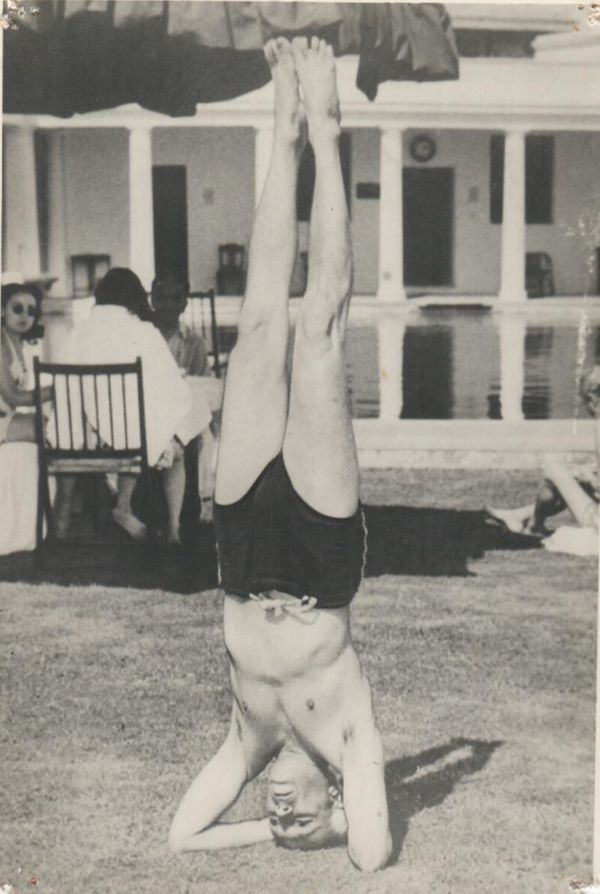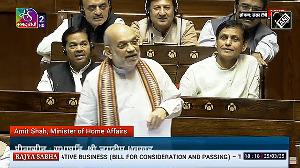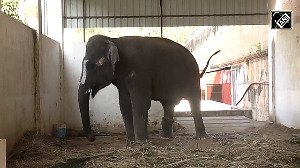'Nehru was singularly clear sighted about the international political situation.'

During the launch of his book, A Life in Diplomacy, former foreign secretary M K Rasgotra said that had then prime minister Jawaharlal Nehru accepted then US President John F Kennedy's offer of helping India detonate a nuclear device much before China did in 1964, India would not need to fight so hard for NSG membership today.
"There is a strong disinformation campaign about Nehru's rejecting an offer to make India a permanent member of the Security Council... Rasgotra's words will be used by those who want to tarnish Nehru's image," K P Fabian, former ambassador to Qatar and Italy, tells Manavi Kapur.
How far are Rasgotra's claims about Kennedy and Nehru true? What are your views about the other claims he makes in his book?
I must make a point of clarification about Rasgotra's narration. He chaired a meeting in 2014 to mark the centenary of G Parthasarathy's birth when (his son) Ashok Parthasarathy presented a paper on Kennedy's offer to help India conduct a nuclear test before China did.
Rasgotra himself had earlier vaguely heard of such an offer, but had not seen any evidence. Rasgotra has narrated the circumstances under which Nehru rejected the offer on the advice of Parthasarathy, entirely based on Ashok's paper.
I have not seen that paper, but I do trust Rasgotra's summing up of it. Ashok has told Rasgotra that the handwritten letter from Kennedy was among his father's papers, he had seen it, and that while shifting houses, it was lost.
Well, in a rational world, the paper should have been with the PMO (Prime Minister's Office) or MEA (ministry of external affairs). I do not distrust Ashok, but I would have found it easier to believe the story in full if it had been based on Rasgotra's own personal knowledge.
Rasgotra has made a few interesting claims and I trust him. For example, when he came in as foreign secretary in 1981, Prime Minister Indira Gandhi had received an invitation in writing from President Ronald Reagan. She wanted to accept it, but P V Narasimha Rao (then external affairs minister), P C Alexander (then principal secretary to the prime minister), and Parthasarathi were against the prime minister going to the US.
Rasgotra spoke to the three, but failed to convince them. He sent a long note to Indira Gandhi recommending she accept the invitation and she approved it. The visit was a great success.
Incidentally, this also shows that if the foreign secretary has direct access to the prime minister, others cannot stand in the way.
What was the geopolitical environment in the 1960s? Did Nehru make grave mistakes with lasting consequences? Or was he an astute leader who understood the global political climate well?
The geopolitical environment in the early 1960s was rather bleak. The Cuban Missile Crisis was in October 1962. In fact, Mao took that into account in timing the invasion of India in the same month.
Nehru's major mistake was in believing that China will not attack India. And consequently, he failed to prepare the army to be in a position of strength to respond to such an attack.
A man of Nehru's grasp of international relations should have known that unless he sent back the Dalai Lama to Tibet, Mao will be vengeful.
Mao himself told a Nepalese delegation post-1962 that the war was not about the border, but about Tibet.
China is paranoid about Tibet and, to an extent, Nehru knew it. But I do not think that it was politically feasible to send the Dalai Lama back.
Nehru was singularly clear sighted about the general international political situation. For example, he was probably the first to anticipate the split between China and the Soviet Union. He mentioned this to (US) Ambassador Chester Bowles in 1951.
To take another example, in September 1950, Nehru transmitted to the US a warning from China not to cross the 38th Parallel (during the Korean War). Nehru was ignored, but after three years and five million deaths -- civilian and military -- the cease-fire was on the same 38th Parallel.
Bruce Riedel, author of JFK's Forgotten Crisis, has said that he is 'sceptical that Kennedy made any such offer' and that 'he was firmly against nuclear proliferation.' Do you agree?
Riedel is right about Kennedy's being against proliferation. But that is only a part of the big picture.
Let us not forget that for years there was a belief in the West that India and China were giving Asia and even the rest of the so-called Third World two different options, a democratic one and a dictatorial one, and the West wanted India to emerge as a beacon for the Third World.
Is this an extension of a seeming effort to discredit Nehru's political legacy?
I would not say that what Rasgotra has said is part of the growing industry of 'Nehru bashing.' But his words will be used by those who want to tarnish Nehru's image.
There is a strong disinformation campaign about Nehru's rejecting an offer to make India a permanent member of the (United Nations) Security Council.










 © 2025
© 2025